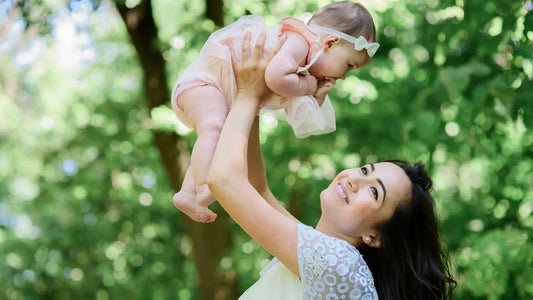How To Keep Your New Baby Safe from Infection
Once you bring your newborn home from the hospital, it's natural to feel excited about introducing your bundle of joy to your loved ones. But at the same time, you want to do everything to protect him from getting an infection from a visitor.
The first few months are the most vulnerable time for a baby's still-developing immune system, making them more prone to infections. But by implementing preventive measures, you can safeguard your baby from illness when they are most at risk.
From tiny newborns to wiggly 10-month-olds beginning to explore and put everything in their mouths, these techniques can help you keep your infant infection-free.
Wash Hands Frequently
One of the most important things caregivers can do to prevent the spread of infection to a new baby is washing hands often. Always wash hands before touching the baby, after changing diapers, after being out in public places, and any time hands are dirty. Use warm water and soap and scrub for at least 20 seconds before rinsing. Hand sanitizer with at least 60% alcohol content also works when soap and water are unavailable. Encourage everyone who interacts with the baby to follow the same hand washing rules.
Limit Visitors
It’s tempting to want to show off your newborn and have lots of friends and family meet your baby right away. However, limiting visitors in the first couple of months is wise to reduce the baby’s exposure to germs and illness. The fewer people interacting closely with your infant, the lower their infection risk. Wait until at least 6-8 weeks before allowing extended family, friends, and strangers to handle your little one.
Keep Vaccinations Up to Date
Make sure you, your partner, and any other caregivers receive flu shots and TDAP (tetanus, diphtheria, pertussis) vaccines at least 2 weeks before interacting with your newborn according to CDC recommendations. Staying attentive to your own immunizations helps provide your baby with some passive immunity through the placenta and breast milk. It also eliminates potential exposure to dangerous illnesses you could pass to the baby.
Breastfeed When Possible
Breast milk provides powerful protection against all infections. Babies who are breastfed receive antibodies from their mother that help fight off viruses, bacteria, and parasites through the milk. Even if you supplement with formula, any amount of breast milk still gives your baby defensive health advantages. The longer you’re able to breastfeed, the more antibodies your baby will receive to boost their developing immune system in the early months.
Sanitize Surfaces and Items
Newborns explore their environments by putting everything in their mouths once they start reaching and grabbing. Make sure any surfaces, toys, clothes, bottles, pacifiers, etc. that come into contact with your baby are regularly sanitized to prevent the spread of germs. Carefully follow directions when using disinfectants on toys and items your little one handles or touches often.
Watch for Infection Signs
While anything can be concerning in a newborn’s first months, fevers are especially dangerous in the first 8 weeks and require immediate medical assessment. Other signs of possible infection in a young baby include reduced appetite or activity level, rapid breathing or chest retractions, extreme sleepiness, vomiting, or a high-pitched cry. Skin infections may appear as a rash, sores, swelling, or discharge. Trust your instincts – if your baby seems “off,” contact your paediatrician right away or go to urgent care/emergency to quickly treat potential infection.
Avoid Crowds and Sick People
Steer clear of crowded indoor spaces and people with any symptoms of illness during your baby’s first 2 months when the risk of infection is highest. Avoid taking new babies out to stores, restaurants, or social gatherings. Only take them to the doctor’s office or small outdoor gatherings where you can control spacing and hand hygiene. Staying away from crowds limits the exposure to respiratory viruses and bacteria spread through sneezing, coughing, and skin contact.

Use Hand Sanitizer Judiciously
Alcohol-based hand sanitizers aren’t recommended for newborns and infants due to health risks if ingested. However, they can be used judiciously on adult hands during outings and errands before touching the baby. Just make sure to let the sanitizer completely dry first, and don’t get it directly on your baby’s skin. Alcohol vapours can also be dangerous to your little one, so ventilation is key. When at home near the baby, handwashing with soap and water is still the best practice.
Consider Immunity Boosters
Enhance your child’s immunity and safeguard against coughs and colds with Natural Baby Immunity Booster Syrup. Probiotics and herbal formulations may offer additional immune support and reduce infection risk during the early months. Always get medical advice before giving any herbal supplements to infants.
Keep Sick Family Members Away
Finally, if anyone in the home develops symptoms of illness such as fever, sore throat, cough, runny nose, vomiting, or diarrhoea, they should stay away from the baby. Designate one healthy adult as the only caregiver for the baby to limit exposure. Have the sick person wear a face mask, stay isolated in their own room as much as possible, use separate bathrooms, and avoid any close interaction with your newborn until the illness has fully resolved.
Conclusion:
During the first few months, your precious baby is most vulnerable to infections. However, by washing hands, limiting visitors, sanitizing everything, and staying away from crowds and sick people, you can greatly reduce their risk. Trust your parenting instincts – if your baby exhibits any concerning symptoms, always contact your paediatrician right away. With smart preventive measures and early treatment when needed, you can keep your bundle of joy happy, healthy, and at home in your loving arms - where every baby belongs.
Shop for the Best Baby care Products
FAQs
1. What is the most important thing parents can do to prevent infections in newborns?
Ans. Washing hands frequently with soap and water for at least 20 seconds before touching the baby is the #1 way to prevent infections from spreading to newborns.
2. When can visitors start handling and holding the baby?
Ans. It's best to limit visitors and not allow extended family, friends, or strangers to hold the baby until 6-8 weeks of age when their immune system has had more time to develop.
3. How long should you breastfeed your baby?
Ans. Breastfeeding for as long as possible gives a baby protective antibodies against infections through the breastmilk. The longer you breastfeed, the more antibodies they receive.
4. What are some signs of a possible infection in a newborn?
Ans. Trust your instincts if your baby seems "off" in any way. Signs include fever, reduced appetite or activity, rapid breathing, extreme sleepiness, vomiting, or a high-pitched cry. Skin infections may appear as a rash, swelling or discharge.
5. When can alcohol-based hand sanitizers be used around a baby?
Ans. Hand sanitizers with 60%+ alcohol are not recommended for infant hands. But adults can judiciously apply after letting hands completely dry before touching the baby. Don't apply directly on the baby's skin.
6. How can you avoid exposure to crowds with a newborn?
Ans. Steer clear of crowded indoor spaces, stores, restaurants and large gatherings in public during the first 2 months. Only take new babies to the pediatrician or small outdoor gatherings where spacing allows distancing.




